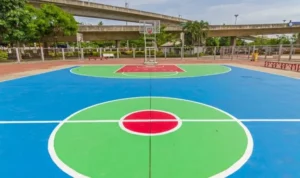To get recruited for men’s volleyball, showcase your skills by participating in club teams, attending college showcases, and reaching out to college coaches directly. Present yourself as a dedicated athlete with a strong work ethic and a passion for the sport.
Building a standout athletic profile and maintaining good academics will increase your chances of getting recruited.
Table of Contents
ToggleImportance Of College Volleyball Recruiting
Understanding The Significance Of College Volleyball Recruitment
College volleyball recruiting is a vital stepping stone for aspiring athletes looking to take their volleyball skills to the next level. It offers a plethora of opportunities for young players to showcase their talent, gain exposure, and secure a spot on a competitive college team. Understanding the significance of college volleyball recruitment can help athletes approach the process strategically and maximize their chances of getting recruited.
Benefits Of Getting Recruited For Men’s Volleyball
Getting recruited for men’s volleyball comes with a multitude of advantages that go beyond playing the sport at a higher level. Here are a few notable benefits:
1. Scholarship opportunities
One of the primary advantages of getting recruited is the potential for receiving athletic scholarships. Many colleges offer scholarships specifically for volleyball players, which can significantly offset the cost of tuition and provide financial assistance throughout a student’s college journey. Scholarships not only make college more affordable but also provide recognition and rewards for an athlete’s dedication and hard work.
2. High-level competition
Being recruited allows athletes to compete at a higher level against top talent. College volleyball teams attract driven, skilled players, creating a competitive environment that fuels growth and development. By regularly facing strong opponents and participating in intense practices, recruits can sharpen their skills, raise their game, and elevate their overall performance on the court.
3. Access to first-rate coaching
College coaches often possess extensive experience and knowledge of the game. Being recruited gives players the opportunity to learn from these seasoned professionals, who can provide invaluable guidance and expertise in refining their techniques, enhancing their game strategy, and honing their volleyball IQ. The guidance and mentorship received from these coaches can greatly impact an athlete’s development and contribute to their long-term success.
4. Exposure to scouts and national tournaments
College programs frequently participate in competitive tournaments and showcase events where recruiters and scouts from professional organizations are present. These events offer athletes the chance to gain exposure and catch the attention of higher-level teams and organizations. Being recruited for men’s volleyball opens doors to these opportunities, increasing the likelihood of eventually playing at the professional level, if that is a player’s aspiration.
5. Personal growth and life skills
College volleyball recruitment provides more than just athletic benefits. Joining a college team exposes athletes to a diverse group of teammates, fostering a sense of camaraderie and teamwork. Through the challenges faced in training and competition, players develop resilience, discipline, time management, and other crucial life skills that extend beyond the volleyball court. These qualities not only contribute to success in the sport but also transfer to various aspects of life, including academics, career, and personal relationships.
In conclusion, the importance of college volleyball recruiting cannot be overstated. It offers numerous advantages, such as scholarship opportunities, high-level competition, access to first-rate coaching, exposure to scouts and national tournaments, and personal growth. Athletes aspiring to play men’s volleyball at the collegiate level should prioritize the recruitment process and actively seek out opportunities to showcase their skills to college coaches.
Developing The Right Skills And Techniques
When it comes to getting recruited for men’s volleyball, developing the right skills and techniques is crucial. College recruiters are looking for athletes who can excel in the fundamental aspects of the game while also demonstrating strong serving, passing, hitting, and blocking abilities. In this blog post, we will break down these key areas, providing you with strategies and tips to enhance your skills and impress potential recruiters.
Mastering The Fundamental Volleyball Skills And Techniques
To stand out as a potential recruit, it’s essential to have a solid foundation in the fundamental skills and techniques of volleyball. These include:
- Serving
- Passing
- Setting
- Hitting
- Blocking
- Digging
Serving: Serving is your team’s first opportunity to disrupt the opponent’s offense. Focus on developing a consistent and powerful serve. Practice different types of serves, such as float serves, jump serves, and topspin serves, to keep your opponents guessing.
Passing: Passing accuracy and consistency are essential skills for any volleyball player. Work on improving your footwork, positioning, and forearm passing technique. Practice receiving various types of services to build your confidence and proficiency.
Setting: Setting plays a crucial role in orchestrating your team’s offense. Strive for accuracy, consistency, and quick decision-making. Practice setting different types of sets, including quick sets, back sets, and shoot sets, to ensure you can adapt to different situations.
Hitting: As an outside hitter, opposite hitter, or middle blocker, having strong hitting skills is vital for catching recruiters’ attention. Focus on improving your approach, timing, and power. Work on hitting from different positions and angles on the court to expand your offensive versatility.
Blocking: Blocking is a defensive skill that can make a significant impact on the game. Develop your ability to read the opponent’s hitters, anticipate their shots, and execute effective blocks. Work on your footwork, hand positioning, and timing to become a formidable force at the net.
Improving Serving And Passing Abilities
To enhance your serving and passing abilities, follow these tips:
- Practice serving drills: Set up targets and aim for specific areas of the court during your serving practice sessions. Experiment with different types of serves to keep your opponents off balance.
- Fine-tune your passing technique: Focus on correct hand positioning, firm wrists, and fluid movement. Use passing drills that simulate game-like scenarios to improve your accuracy and consistency.
- Work on footwork: Good footwork is crucial for both serving and passing. Practice agility drills and footwork exercises to improve your ability to move quickly and efficiently.
- Seek feedback: Ask a coach or experienced player to observe and provide feedback on your serving and passing technique. This external perspective can help you identify areas for improvement.
Enhancing Hitting And Blocking Techniques
To take your hitting and blocking techniques to the next level, consider the following strategies:
- Build strength and explosiveness: Incorporate strength training exercises, such as squats, lunges, and plyometrics, to improve your power and explosiveness during hits and blocks.
- Practice different hitting angles: Work on hitting from various spots on the court and experiment with different angles to develop a versatile offensive game.
- Study opponents: Watch game footage of opponents to analyze their hitting tendencies. This will help you anticipate their shots and position yourself for effective blocks.
- Improve vertical jump: Develop your vertical jump through targeted exercises like jump squats and box jumps. A higher vertical leap will enable you to reach higher and block more effectively.
Showcasing Your Talent To College Coaches
As a aspiring men’s volleyball player looking to get recruited, it’s crucial to showcase your talent to college coaches. By effectively highlighting your skills, you can stand out among other athletes and increase your chances of getting noticed. Here are a few strategies to help you showcase your talent and catch the attention of college coaches:
Attending Volleyball Camps And Showcases
Attending volleyball camps and showcases is a fantastic way to showcase your talent to college coaches. These events allow you to demonstrate your skills, interact with coaches, and get valuable feedback. When choosing camps and showcases to attend, make sure to prioritize those that are well-known and reputable within the volleyball community. These events offer opportunities to not only showcase your skills but to network with coaches and make a memorable impression.
By participating in drills, scrimmages, and game-like situations, you can exhibit your athleticism, technique, and overall volleyball IQ. Don’t be afraid to compete against top-level players, as it will only enhance your exposure and challenge you to perform at your best. Additionally, take advantage of the coaching staff’s presence at these events and approach them during breaks or downtime to introduce yourself and express your interest in their program.
Creating A Standout Volleyball Highlight Video
A standout volleyball highlight video is an excellent tool to showcase your talent to college coaches, especially if attending in-person events is not feasible. Your video should highlight your most impressive skills, such as powerful spikes, precise serves, skilled blocking, and exceptional court awareness. Make sure to capture different angles and close-ups to provide coaches with a comprehensive view of your abilities.
In addition to on-court action, including short clips showcasing your work ethic, dedication, and teamwork can add depth to your video. Coaches appreciate players who demonstrate a positive attitude, leadership skills, and a strong work ethic both on and off the court. Consider including a short introduction in your video, where you mention your name, position, achievements, and aspirations. Keep the length of your video concise but long enough to present a variety of skills, typically ranging from three to five minutes.
Reaching Out To College Coaches
Directly reaching out to college coaches is an invaluable way to make a lasting impression and showcase your talent. Start by researching the programs you are interested in and gather contact information for the coaches. Craft a personalized email or make a phone call to express your interest in their program and inquire about any upcoming recruiting opportunities.
When contacting coaches, remember to highlight specific aspects of their program that align with your goals and aspirations. Be prepared to share your athletic and academic achievements, along with your volleyball experience. Always remain professional, respectful, and concise in your communication. Reaching out to coaches shows initiative, demonstrates your commitment to playing volleyball at the collegiate level, and can lead to further discussions or invitations to their campus for further evaluation.
By attending volleyball camps and showcases, creating an outstanding highlight video, and proactively contacting college coaches, you can effectively showcase your talent and increase your chances of getting recruited. Remember, consistently putting in the effort and staying persistent will maximize your opportunities and help you reach your goal of playing college-level volleyball.
Academic Preparation For College Volleyball
When it comes to getting recruited for men’s volleyball, academic preparation plays a crucial role. Colleges not only look for talented athletes but also for individuals who can excel in the classroom. Maintaining a strong academic performance, balancing academics and sports, and understanding the importance of eligibility and GPA are all essential aspects that aspiring college volleyball players need to consider. In this article, we will delve into these topics, providing valuable insights and tips to help you prepare academically for college volleyball.
Maintaining Strong Academic Performance
Academic performance plays a significant role in the college recruitment process for men’s volleyball. Alongside your athletic abilities, colleges are keen to recruit athletes who exhibit a dedication to their studies. Maintaining a strong academic performance not only demonstrates your commitment but also opens doors to a broader range of opportunities. Here are some tips to help you excel academically:
Unordered List
- Develop effective study habits and time management skills.
- Stay organized and keep track of your assignments and deadlines.
- Seek support from teachers, tutors, or academic advisors when needed.
- Take advantage of resources such as libraries, online databases, and study groups.
Balancing Academics And Sports
Balancing academics and sports can be challenging, but it is essential to succeed both on and off the court. Here are some strategies to help you manage your time effectively:
Ordered List
- Create a schedule that includes designated study time and practice sessions.
- Prioritize tasks and focus on completing high-priority assignments first.
- Utilize downtime wisely, such as studying during bus rides or breaks between classes.
- Communicate with your teachers and coaches about your commitments and seek their guidance if needed.
Understanding The Importance Of Eligibility And Gpa
In addition to maintaining strong academic performance, understanding the importance of eligibility and GPA is crucial. The National Collegiate Athletic Association (NCAA) sets certain academic standards that student-athletes must meet to be eligible to compete at the collegiate level. These standards include a minimum GPA requirement and satisfactory completion of core courses. Here are key points to keep in mind:
| NCAA Eligibility Guidelines | GPA Requirements | Core Course Requirements |
|---|---|---|
| Div. I – 2.3 GPA or higher | 16 Core Courses | 4 years of English, 3 years of math, 2 years of natural/physical science, etc. |
| Div. II – 2.2 GPA or higher | 16 Core Courses | 3 years of English, 2 years of math, 2 years of natural/physical science, etc. |
It is essential to meet these requirements to ensure your eligibility for college volleyball. Remember, your GPA not only affects your eligibility but also impacts your chances of earning academic scholarships. So, strive to achieve and maintain a strong GPA throughout high school.
Navigating The Recruitment Process
Navigating the recruitment process is a crucial step towards getting recruited for men’s volleyball. It requires careful research, a deep understanding of NCAA rules and regulations, and building strong relationships with college coaches. In this section, we will explore each of these aspects in detail and provide guidance on how to successfully navigate the recruitment process.
Researching colleges and universities with men’s volleyball programs
1. Researching Colleges And Universities With Men’s Volleyball Programs
Research plays a pivotal role in finding the right colleges and universities that offer men’s volleyball programs. Start by compiling a list of potential schools that align with your academic, athletic, and personal preferences. When researching, consider the following:
- Location: Determine if you prefer urban, suburban, or rural environments. Consider factors such as climate, distance from home, and access to amenities.
- Academics: Explore the academic programs offered at each institution and ensure they align with your career goals. Look for a good balance between academics and athletics.
- Program success: Investigate the success of the men’s volleyball program at each school. Look at their performance in recent seasons, conference standings, and any notable achievements.
- Social fit: Consider whether the campus atmosphere, student body, and overall culture of the institution resonate with your personal values and preferences.
Understanding the NCAA rules and regulations
2. Understanding The NCAA Rules And Regulations
Familiarizing yourself with the NCAA rules and regulations is imperative to ensure eligibility and compliance throughout the recruitment process:
- Academic eligibility: Understand the academic requirements set by the NCAA, including GPA, standardized test scores, and core course requirements.
- Eligibility centers: Register with the appropriate NCAA eligibility center, such as the NCAA Eligibility Center or the NAIA Eligibility Center, depending on the division level you are aiming for.
- Contact rules: Know the rules regarding contact with college coaches. Stay aware of when communication can start and what types of communication are allowed at each stage of the process.
- Official and unofficial visits: Learn about the guidelines for official and unofficial visits to campuses and make sure to adhere to them.
Building relationships with college coaches
3. Building Relationships With College Coaches
Developing strong relationships with college coaches is crucial in the recruitment process. Coaches want to see not only your athletic abilities but also your character and potential as a student-athlete. Here are some effective strategies for building relationships with college coaches:
- Email communication: Send personalized and well-crafted emails to introduce yourself, express your interest, and provide relevant information about your athletic achievements.
- Attend camps and showcases: Participate in camps, showcases, or tournaments where college coaches can evaluate your skills and performance.
- Phone conversations: Initiate phone conversations with coaches to build a more personal connection and ask any questions you may have about the program.
- In-person meetings: If possible, arrange face-to-face meetings with coaches during campus visits or other recruiting events. This allows them to get to know you better and vice versa.
- Stay proactive: Keep coaches updated on your progress, achievements, and upcoming competitions. Maintain regular communication with them to demonstrate your commitment and continued interest.

Credit: www.forbes.com
Frequently Asked Questions Of How To Get Recruited For Men’s Volleyball?
How Do You Get Into Men’s Volleyball?
To get into men’s volleyball, start by honing your skills through practice and playing in local leagues or school teams. Attend volleyball clinics and camps to improve your technique. Showcase your skills by participating in tryouts for college or professional teams.
Stay dedicated, disciplined, and passionate about the sport to increase your chances of success.
Is It Hard To Get A Men’s Volleyball Scholarship?
Men’s volleyball scholarships can be competitive, but with dedication and skill, it is possible to obtain one.
How Tall Do You Have To Be To Play D1 Men’s Volleyball?
To play D1 men’s volleyball, there is no specific height requirement. Skill, athleticism, and determination are key factors in making the team.
How Do You Get Recruited In Volleyball?
To get recruited in volleyball, showcase your skills through playing in high-level tournaments, joining club teams, and attending volleyball camps. Build a strong athletic resume and highlight your achievements, including stats, awards, and leadership roles. Create a professional video that showcases your skills.
Network with coaches and scouts, and communicate your interest in playing at their college or university.
How Can I Increase My Chances Of Getting Recruited For Men’s Volleyball?
To increase your chances of getting recruited for men’s volleyball, focus on improving your skills, attending camps and showcases, maintaining good grades, and reaching out to college coaches.
What Are College Coaches Looking For In Men’s Volleyball Recruits?
College coaches typically look for recruits with strong technical skills, athletic ability, good academics, leadership qualities, and a strong work ethic.
Conclusion
To conclude, improving your chances of getting recruited for men’s volleyball requires dedication, hard work, and strategic planning. By focusing on your skills development, networking with coaches, showcasing your talent through video highlights, maintaining strong academics, and staying proactive in the recruitment process, you can maximize your opportunities.
Remember, the journey may be challenging, but with perseverance and a positive mindset, you can achieve your goal of playing collegiate volleyball.
You may also like to read this – What is a Pin Hitter in Volleyball?






